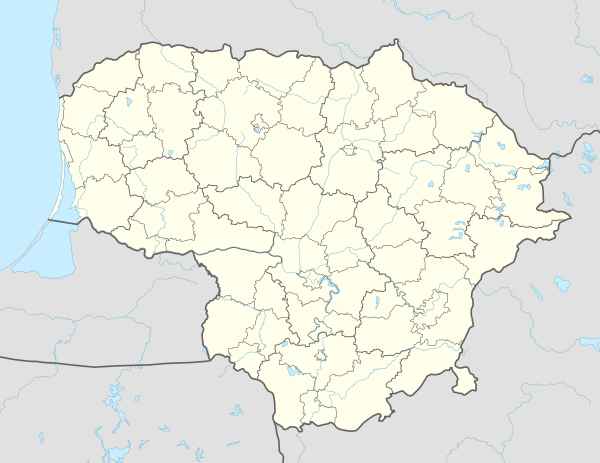Pabradė
| Pabradė | ||
|---|---|---|
| City | ||
 | ||
| ||
 Pabradė Location of Pabradė | ||
| Coordinates: 54°59′0″N 25°47′0″E / 54.98333°N 25.78333°ECoordinates: 54°59′0″N 25°47′0″E / 54.98333°N 25.78333°E | ||
| Country |
| |
| Ethnographic region | Aukštaitija | |
| County |
| |
| Municipality | Švenčionys district municipality | |
| Eldership | Pabradė eldership | |
| Capital of | Pabradė eldership | |
| First mentioned | 15th century | |
| Granted city rights | 1946 | |
| Population (2011) | ||
| • Total | 5,994 | |
| Time zone | UTC+2 (EET) | |
| • Summer (DST) | UTC+3 (EEST) | |
Pabradė (![]()
Pabradė is a busy place as the Vilnius–Daugavpils railway is close to the city. It was quite a small settlement until the 19th century, when the Warsaw – Saint Petersburg Railway was built in 1862.
History
About 850 Jews lived in the town in 1939, comprising one third of the total population. After June 1941, at the very beginning of the occupation, about a dozen Jews were executed for alleged collaboration with the Soviets. In the middle of July, Lithuanian policemen arrested about 60 Jews and shot them behind the mill. On September 1, the rest of the Jewish population was moved into a ghetto that was established on two streets, previously inhabited by Christians. The ghetto was open, so many of its residents escaped at the end of the month, after rumors about the forthcoming Aktion had spread. Over 100 Jews who were interred in the ghetto or who were recaptured were escorted to the military training camp in Švenčionėliai and shot on October 8–10, along with thousands of other Jews assembled there.[1] Policemen continued searching for Jewish escapees, gathered them in groups and shot them on the outskirts of town.[2]
Population
In 2011, the city's population was composed of Poles - 44,73% (2681), Lithuanians – 26,81% (1607), Russians - 18,45% (1106), Belarusians - 5,27% (316), Ukrainians - 1,17% (70), others - 3,57% (214).[3]
References
- ↑ "Holocaust Atlas of Lithuania". holocaustatlas.lt. Retrieved 15 July 2017.
- ↑ "YAHAD - IN UNUM". yahadmap.org. Retrieved 15 July 2017.
- ↑ "Miestų gyventojai pagal tautybę 2011". osp.stat.gov.lt. Retrieved 30 April 2017.
External links

